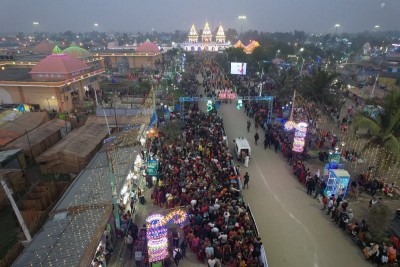
Australia will return three culturally significant artefacts to India during PM Scott Morrison's visit in January
New Delhi/IBNS: The Australian Government will return three culturally significant artefacts during its Prime Minister Scott Morrison's visit to India in January 2020, a media release by the Australian High Commission in India said here.
The artefacts, which were held by the National Gallery of Australia (Gallery), were purchased in good faith, but extensive research undertaken by the Gallery has led to its decision to voluntarily return these artefacts to India.
The artefacts being returned are: Pair of door guardians (dvarapala) 15th Century, Tamil Nadu, India - (two works); and The serpent king (Nagaraja) 6th to 8th Century, Rajasthan or Madhya Pradesh, India.
“Like India, we understand the value of our ancient cultures and artefacts,” the Prime Minister said.
“The return of these artefacts is the right thing to do. This is another demonstration of deep relationship between Australia and India.”
Both India and Australia are party to the UNESCO 1970 Convention on the Means of Prohibiting and Preventing the Illicit Import, Export and Transport of Ownership of Cultural Property.
“The strong ties Australian and Indian institutions have made in recent years have helped develop important professional relationships and share culture. The return of these artefacts also underscores the world’s debt to India’s magnificent culture, history and legacy,” the Minister for Foreign Affairs Marise Payne said.
“Historic artefacts play a significant role in modern society by allowing communities to acknowledge and celebrate their shared history and culture. The National Gallery of Australia recognises this, and is strongly committed to the ethical collecting of cultural material and best practice collection management. I commend the Gallery for resolving these legacy issues,” the Minister for Communications, Cyber Safety and the Arts Paul Fletcher MP said.
Criminal law proceedings are currently underway in India and the United States against former New York art dealer Subhash Kapoor, from whom these artefacts were purchased. The Australian Government does not have any role in these proceedings, it said.
Meanwhile, the National Gallery of Australia in a release said it has deaccessioned three Indian sculptures from the national collection and will voluntarily return them to the Government of India after new information emerged regarding their ownership history.
National Gallery of Australia Director Nick Mitzevich said the Gallery and its staff were committed to the ethical collection of cultural material and best practice collection management.
“We are committed to resolving provenance issues as a highest priority — we now know enough about these works and want to see them returned to their rightful owners,” Mitzevich said.
All three works were bought from New York art dealer Subhash Kapoor. The decision to formally deaccession and repatriate the sculptures follows new evidence in criminal charges levelled against Kapoor in New York.
“After studying the criminal complaint, there was sufficient doubt around the provenance of these sculptures to remove them from the national collection. We take these matters very seriously and have acted at the earliest opportunity,” Mitzevich said.
“Governance procedures have been implemented for us to assess and find a resolution on issues of provenance across the national collection. This includes reviewing works where there is any concern regarding their ownership history and establishing an Ethics Advisory Committee, which will be responsible for overseeing provenance processes.”
Former High Court Justice Susan Crennan has conducted two provenance reviews for the National Gallery of Australia and, most recently, provided a framework for evaluating evidence and assessing works of art with questionable chains of ownership. Where there was a high probability the works were stolen or illegally exported, as in the case of the three sculptures, deaccession and repatriation was recommended.
Following its extensive provenance research over recent years, the National Gallery’s specialist provenance team is now recognised as a global leader in the field. The Gallery is committed to ongoing research across its collection to ensure it meets the highest standards expected of a national collecting institution.
Support Our Journalism
We cannot do without you.. your contribution supports unbiased journalism
IBNS is not driven by any ism- not wokeism, not racism, not skewed secularism, not hyper right-wing or left liberal ideals, nor by any hardline religious beliefs or hyper nationalism. We want to serve you good old objective news, as they are. We do not judge or preach. We let people decide for themselves. We only try to present factual and well-sourced news.







